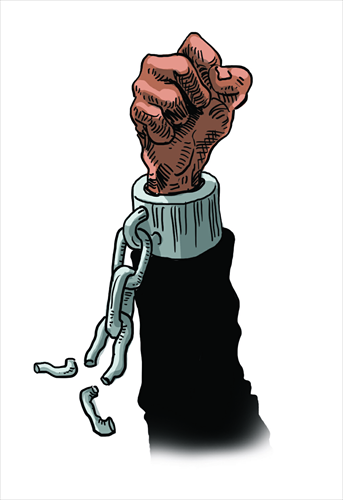Mandela's legacy can shape Africa's future

Illustration: Liu Rui/GT
Nelson Mandela unified a country that had been deeply divided by race relations and inequality. A giant among men, he even commanded authority outside South Africa.
In his 20s, Mandela fought against apartheid, and undertook efforts to improve the social, economic and political lives of Africans. He called on Africans to fight against poverty, ignorance and poor healthcare. In 1993, the gallant fighter for freedom was awarded the Nobel Peace Prize for his efforts to end apartheid. He built a country anchored on equality and justice for all despite spending 27 years in prison.
To Mandela, education was the most powerful weapon Africa could use to transform itself. Upon becoming president of South Africa after winning his country's first democratic and multiracial elections in April 1994, Nelson Mandela's first call was to reinforce the foundations of the hard-won democracy.
At that time, the core threat to the nation's stability emanated from right-wing radicalism. Mandela persuaded the white populace that they belonged wholly in the new South Africa. He was firm that a black-led government would not treat them the way previous white leaders had treated blacks.
During the transition from apartheid minority rule to an all-inclusive democracy, he called for reconciliation as a cornerstone for his presidency. He worked hard to assure the white population that they would be treated equally, like any other South African.
Even though institutional structures had been erected to minimize white fears, for instance, the sunset clause which allowed white civil servants to stay in their workplace as long as they wished, Mandela used the powers conferred unto him to disarm opponents and charm detractors.
Apart from his relentless fight against racism, Mandela bridged the divides between the two rival races. In 1995 when the country hosted the Rugby World Cup, he called on his fellow blacks to rally behind their national team, Springboks, which was strongly hated as it was perceived to be a representation of white rule.
On assuming the presidency, Mandela created a grand cabinet, with Frederick de Klerk, a white South African, as his first deputy president. He also captained the launch of a new constitution, drafted principally by lawyers of the African National Congress party and the governing National Party, which contained assurances to whites and other minorities. It detailed a bill of rights and a constitutional court to enforce it.
Controversially, Mandela masterminded the creation of a Truth and Reconciliation Commission to investigate crimes committed under apartheid. Requesting that extremists stand down was a remarkable deed.
By the early 1990s when Mandela was negotiating the end of apartheid, black South Africans had been horribly oppressed for ages. Sizable portions of those who had made sacrifices to remove apartheid expected heavy punishment and retribution.
Yet, Mandela's wisdom in reaching out to the old enemy is the core reason why South Africa has consolidated its transition from oppression to democracy.
The triumphant expression of Mandela's work is seen in a political system that, two decades after he took power, remains as stable as it is validly democratic. The rule of law, freedom of speech, free and fair elections are the gifts Mandela has bestowed on his nation. After he left office 14 years ago, Mandela dedicated substantial time and resources through the Nelson Mandela Foundation.
This was aimed at raising awareness of and taming the HIV/AIDS epidemic. Indeed, he took the road less travelled in 2002 when he publicly attacked Thabo Mbeki, his successor, for delaying the implementation of a grand plan aimed at fighting HIV/AIDS. Flaws, nevertheless, abound today, stemming from corruption, crime and unemployment in all their creeping manifestations.
The African National Congress, the dominant and ruling party of post-apartheid South Africa, is sharply divided. Its share of the vote has been shrinking while its top leadership wrangles over its control. Less than a year ago, senior figures expelled from the party the fiery Youth League leader Julius Malema for "sowing divisions" within its ranks. These could in time destroy the edifice Mandela built.
Crime is a prominent issue in South Africa. On average, about 50 people are murdered in South Africa every day. Sometimes, these anti-social actions have been linked to unemployment in the country. As of late 2012, the number of jobless South Africans had increased by 100,000 people to 4.6 million. Appallingly, the problem of corruption is also high in South Africa. It includes the private use of public resources, bribery and improper favoritism.
The 2012 Transparency International Corruption Perceptions Index assigned South Africa an index of 4.3, ranking it 69th out of 176 countries. But it will not undermine Mandela's place in history. His is more durable than any political misconstruction.
Mandela has achieved the historically rare feat of uniting a deeply divided nation. This is no mean work. African countries have perpetually been in conflicts because of such sutures.
Today, the Nigerian leadership has failed to unite its more than 168.8 million people. Sudan and South Sudan were split because the leaders could not stomach the overwhelming pressure of uniting the oil-rich country.
Mandela appealed to people's common humanity while he was behind bars. He learnt invaluable lessons in leadership. He has indeed appreciated in the past that the 27-year stay in prison shaped him.
The detention showed him that forgiveness, kindness and respect were powerful weapons of political persuasion.
The author is a veteran journalist and PhD candidate of journalism in University of Nairobi, Kenya. mkapchanga@gmail.com